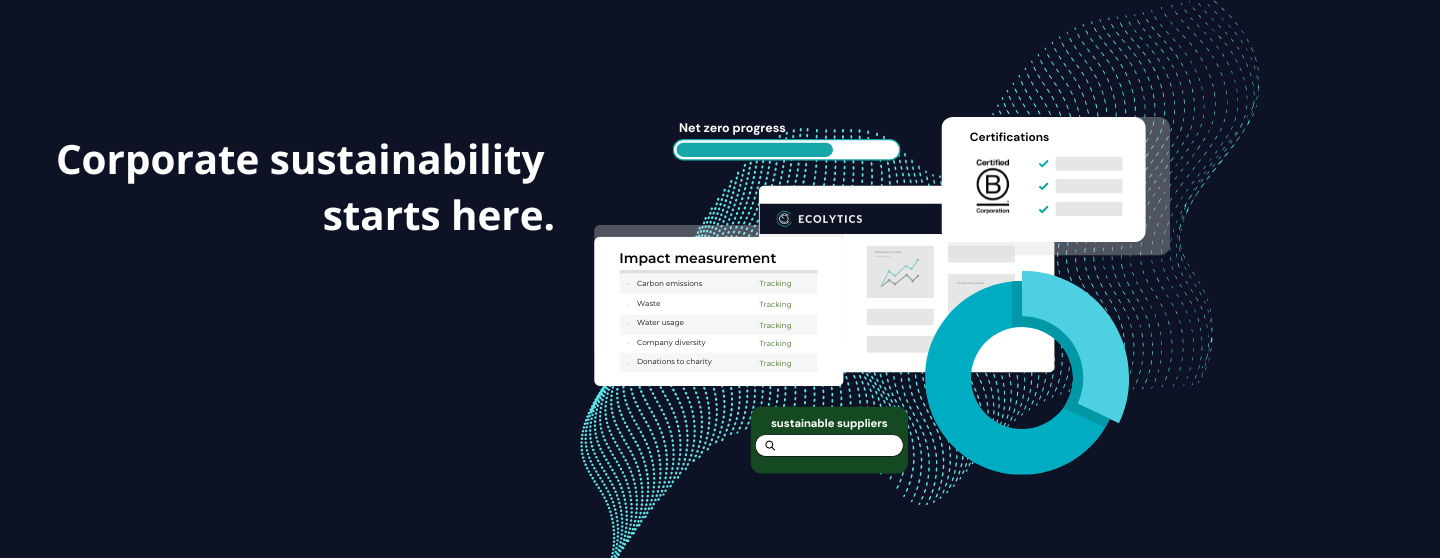

Ecolytics

District of Columbia, United States
August 2024
Software publishing and SaaS platforms
Service with Minor Environmental Footprint
Canada,
France,
Ireland,
United Kingdom,
United States
Ecolytics is a software platform enabling companies to build effective, data-driven sustainability programs. We specialize in working with B Corps to streamline the process of (re)certification, helping companies measure, improve, and showcase their impact. Our platform helps companies: _Save hundreds of hours/thousands of dollars in the collection and management of all impact metrics needed for B Corp; _Ensure compliance with B Corp standards (current and upcoming!) and seamlessly report for recertification; _Easily generate annual and real-time reports to meet transparency/annual reporting requirements; _Continuously identify opportunities for improvement on B Corp, set goals, and more! Visit our website to learn more and request a demo (https://www.ecolytics.io).
Overall B Impact Score
Governance 19.0
Governance evaluates a company's overall mission, engagement around its social/environmental impact, ethics, and transparency. This section also evaluates the ability of a company to protect their mission and formally consider stakeholders in decision making through their corporate structure (e.g. benefit corporation) or corporate governing documents.
What is this? A company with an Impact Business Model is intentionally designed to create a specific positive outcome for one of its stakeholders - such as workers, community, environment, or customers.
Community 26.9
Community evaluates a company’s engagement with and impact on the communities in which it operates, hires from, and sources from. Topics include diversity, equity & inclusion, economic impact, civic engagement, charitable giving, and supply chain management. In addition, this section recognizes business models that are designed to address specific community-oriented problems, such as poverty alleviation through fair trade sourcing or distribution via microenterprises, producer cooperative models, locally focused economic development, and formal charitable giving commitments.
Environment 10.3
Environment evaluates a company’s overall environmental management practices as well as its impact on the air, climate, water, land, and biodiversity. This includes the direct impact of a company’s operations and, when applicable its supply chain and distribution channels. This section also recognizes companies with environmentally innovative production processes and those that sell products or services that have a positive environmental impact. Some examples might include products and services that create renewable energy, reduce consumption or waste, conserve land or wildlife, provide less toxic alternatives to the market, or educate people about environmental problems.
Customers 36.0
Customers evaluates a company’s stewardship of its customers through the quality of its products and services, ethical marketing, data privacy and security, and feedback channels. In addition, this section recognizes products or services that are designed to address a particular social problem for or through its customers, such as health or educational products, arts & media products, serving underserved customers/clients, and services that improve the social impact of other businesses or organizations.
What is this? A company with an Impact Business Model is intentionally designed to create a specific positive outcome for one of its stakeholders - such as workers, community, environment, or customers.